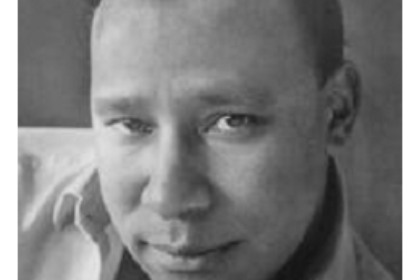THREE POEMS by Rumiko Kora, trans. Judy Halebsky & Ayako Takahashi FIVE POEMS by Ryoichi Wa...

INTRODUCTION TO KORA RUMIKO & WAGO RYOICHI by Judy Halebsky

MONTHLY with Alexander Duringer
Alexander Duringer is from Buffalo, NY and earned his MFA in Poetry from North Carolina State U...

INTERVIEW WITH Alexander Duringer
Alexander Duringer is from Buffalo, NY and earned his MFA in Poetry from North Carolina State U...

INTERVIEW WITH Jared Harél by Urvashi Bahuguna
Jared Harel’s poems are quiet records of the layers inside the ordinary days of our lives, expo...

AN ENGINE FOR UNDERSTANDING: AN INTERVIEW WITH Willie Lin
Willie Lin’s debut poetry collection, Conversations Among Stones, will be published in November...
Take Four: An Interview with C. Dale Young

In the second installment of our new interview series, “Take Four,” we talk to contributor C. Dale Young about his new work in short fiction, the subtle differences between poetry and prose, and the alchemy of characterization.
FWR: As an artistic mode, poetry seems to have served you well in the past. Was there anything in particular that turned your thoughts toward fiction?
CDY: First of all, thank you for saying poetry has served me well. Most of the time, I question whether or not I have served poetry well… I began writing with the belief I would be a fiction writer, a novelist. But I discovered poetry in college and found I had a better facility, a quicker facility, with it. I became discouraged about writing fiction. Later, as I began to publish more and more poems, fiction became something I remained interested in but then became afraid of writing for fear I’d look like an idiot. But I went to give a reading at Oregon State University six or seven years ago, and I did a roundtable discussion. It came up in the discussion, by the fiction writers there, that it seemed odd I didn’t write fiction. I think I laughed it off. But at that time, I had been trying to do something different with my poems, something requiring more than one voice, more than one mentality, and I was having real difficulties executing that. Maybe a better poet would have been able to do that, but I couldn’t.
On the way back to the airport, on a shuttle between Corvalis and Portland, this sentence came into my head: “No one would have believed him if he had tried to explain that he watched the man disappear.” I typically come up with the last lines of my poems first, but try as I did, this sentence did not seem like a line of one of my poems. I joked with myself, there on the shuttle bus, that maybe this was the start of a short story. So I poked around at the sentence in my head and then wrote it down on a piece of paper. As I looked at the sentence, I changed it to: “No one would have believed Ricardo Blanco if he had tried to explain that Javier Castillo could disappear.” I knew this was not a line from one of my poems, pulled out my laptop and typed the sentence. By the time I reached the airport, I had written about 700 words of this story that would become “The Affliction.”
I have no idea why at that moment I would start writing a story. And maybe I was able to start a story for years and years but never paid attention. I am not sure. But that story I wrote ended up prompting several other stories, some about the characters in “The Affliction,” some narrated by them, some about ancillary characters. That story opened a world for me that I haven’t really left yet.
FWR: As you mention, the character of Javier Castillo in your story “The Affliction” is literally able to disappear. In the end, he does so permanently. This is an interesting contrast to Leenck in “Between Men,” a character who also faces the prospect of literal disappearance, though in this case it’s decidedly against his will. What do you find attractive about the subject of disappearance, voluntary or not?
CDY: I have to be honest; I wasn’t aware of my attraction to disappearances. But now that you bring it up, it seems to exist in my poems as well. Several of the poems I have written in the last 7 years have this idea of disappearing in them. I guess that isn’t so odd seeing these stories were written in the same time period. But wow, I wasn’t aware of that until you just brought it up.
In my day to day life as a physician, as an oncologist, I am keenly aware of people disappearing. Some fight until the end of their lives to stay present, and others give up and disappear long before their physical bodies do. The ways in which the mind deals with mortality have always interested me, and it occurs to me now that my attraction to this idea of disappearance might stem from my own mind working this out. I am not entirely sure, though you have given me much to think about!
FWR: When writers talk about the differences between poetry and fiction, there’s often some “grass is greener” mentality on both sides of the fence. As well as a lot of wondering whether or not “crossing over” is even possible. Having had some experience with both, do you think there’s really as much difference between the forms as we seem to think there is?
CDY: Well, we all, poets and fiction writers, come from the same heritage, the epic poem. Some forget that in the scope of literary history, the novel is a fairly new thing. Both poets and fiction writers, in order to do what we do well, must not only tell a story but create an experience, or the sense that one as a reader is enmeshed in the experience. Lyric poetry tries to provide a flash of an experience, something brief and intense. Most fiction provides a more gradual enveloping of the reader into the world of the story or the novel. Many of our tools are the same. But the genres are different. Their ways of captivating readers are different. At base, the tools might be similar or the same, but the execution of the writing and the goals of the writing are usually different. I guess what I am saying is that poets have much to learn from fiction writers. Studying fiction allows them to better see the speaker of a poem as a created thing akin to a character in a novel. And fiction writers have much to learn from poets. Studying poetry allows them to better use figuration, to set scene with a keen eye, etc. Some “cross over” to use your phrase. Many will never feel a desire to do both.
FWR: In an interview for the American Literary Review you said that you once “…falsely believed that the love poem was in essence a dead form… What I realized with time is that the love poem isn’t dead but just incredibly difficult to pull off…” Both “The Affliction” and “Between Men” evoke beautifully complicated forms of love. Do you think love stories are just as difficult? What do you think makes these particular stories work?
CDY: I suspect the love story is also a “dead form.” Like the love poem, one must be ever vigilant when writing a love story to avoid the trap of cliché. This is incredibly difficult. I don’t think of “The Affliction” as a love story. I suspect I actually think of it more as a falling out of love story, which is just as dangerous. I didn’t conceive of “Between Men” as a love story, and I resist the idea of it being a love story. But I do see why you would raise the issue. In many ways, Leenck wants to love Carlos but cannot. And yet, in the end, it is his love for Carlos, in whatever form, that does him in. As for what makes these stories work? A little bit of hard work and a lot of alchemy. A lot of alchemy.
FWR: Alchemy. That’s an interesting word. I think you’d agree that stories often start to cohere at the moment their characters – and their characters’ relationships to one another – become complex or detailed enough to give the story life. Have you ever been surprised by one of these moments?
CDY: I have. These moments have happened to me countless times over the years, both in writing poems and stories. In the two stories you mentioned, one spawned the other. The narrator of “The Affliction” is the Carlos in “Between Men.” My desire to “know more” about Carlos led me to this story. And the sons and wife of Javier Castillo end up having their own stories. And even the most recent story I drafted examines one of Javier’s sons who is locked up in a ward for mentally unstable people who have committed crimes. This discovery of the person within and behind the story is what keeps me going back to the writing. I need to know, and that need is what many times generates the story. The story might start with an image or a sentence or a realization in my head, but the stories always move forward as I figure out the characters, what motivates them. It is funny, but Carlos, Javier, Leenck, Flora Diaz, these characters I know I created, seem to me, at times, very real people, something that must have come not from inside but from without. And that is alchemy to me; something not magical, perhaps, but close to it.
|
“With clarity and precision, the poems uncover the secrets of blood and lust and heart, the nature of selfhood, and the accompanying larger social and political implications of identity. Beneath all this is a quest for beauty and evidence of the poet’s deeply humane intelligence and the breadth of his sensibilities.” —Natasha Trethewey
“Between Men,” by C. Dale Young
|
|
More Interviews |




